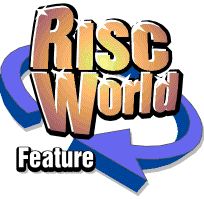



Magazine roundup
David Bradforth gets out there to see what's on offer in print for the RISC OS user.
If you are a regular user of a Windows PC, you're probably familiar with magazines such as PC Home, PC Answers and Windows Made Easy. Regular Macintosh users are more likely to be familiar with MacWorld and MacFormat, both of which appeal to a similar - yet somewhat different - type of reader; with MacFormat appealing to the masses, and MacWorld being more of a professional slant.
If you go by the newsstand magazines, Acorn users have just two choices: Acorn User or the mighty Computer Shopper. Computer Shopper isn't of relevance for a large part, as there are just two pages a month for the Acorn user (and also similar for Mac, Amiga and ST users). But what you may not be aware of is the availability of a large number of subscription-based magazines, catering for all aspects of the market.
In this article, we shall highlight each magazine; offer a brief description and provide contact details; should you decide to add a subscription to that title to your RISC World subscription.
Acorn User
- Publisher: Tau Press Limited
- Tel: 0161 429 8902
- Email: enquiries@acornuser.com
Acorn User was launched in 1982 by Addison Wellesley, whom I believe are now a part of the global Pearson company. The original brief was simple: there were thousands of people out there with Acorn Atoms and BBC Model A's: something was needed which offered support to those very users.
To all intents and purposes it was very succesful; indeed I can remember the December 1991 issue which reached [a record] 230-odd pages... including 32 pages of games coverage, itself a major achievement for the Acorn platform and gamers within.
Around the time of the BBC Model B's release, two indivuals came together to found Redwood Publishing; an independant publishing company which would henceforth take on the publication of the magazine. This went on well until 1993, when Redwood decided to expand on the contract publishing side of the business; and the magazine was sold to IDG Communications Limited.
So we get to the year 2000. Current editor Steve Turnbull led a management buyout of the magazine in late 1998, in order to guarantee a long term survival for the magazine. A decision was made to scrap cover discs in favour of CD-ROMs [which seem to prove popular] and there's a constant stream of vary positive information published in every issue.
Acorn User is the only newsstand publication dedicated to users of RISC OS computers. It's priced at £4.20 per issue, with subscriptions starting at about £16.00. For full details, contact Tau Press Limited on the above number, or by email.
Archive
- Publisher: Archive Publications
- Tel: 01603 441777
- Email: sales@archivemag.co.uk
Archive first appeared around 1987 - the launch of the A305. Editor Paul Beverley noticed that Acorn's new creation had a great deal of potential for enthusiasts; and hence Archive was born: a magazine written by enthusiasts, for enthusiasts. Up until 1991, Archive was produced using a Macintosh; but as soon as Impression became available - and the machines were deemed to be capable - production switched to RISC OS.
The format of Archive is simple enough: users submit articles on topics which interest them, which are then published to the benefit of other users. And nobody - except, perhaps, Paul (although we'll forgive that) - gets paid for it.
There's no colour, but with a magazine of this type it doesn't really need it. All we can really say is thanks for going so long Paul, and we hope you'll keep it up!
Acorn Publisher
- Publisher: Akalat Publishing
- Tel: 01582 881614
- Email: akalat@kbnet.co.uk
Back in 1994, Mike Williams found himself in the position where he needed to decide what to do next. Thankfully, Acorn Publisher - the only Acorn magazine devoted to a specific topic - was born.
If publishing and design - either in print or via new media - is your thing, Acorn Publisher has something to offer you. With regular articles on DTP, vector graphics, bitmap graphics, makeovers, and more if you're even slightly interested (especially now that Computer Publishing has closed) - we'd recommend this to all.
We shall, for the moment, leave this here. Next time, I'll conclude by going a little further in depth into some of the above; plus looking back nostalgically at some now dearly departed friends.
David Bradforth